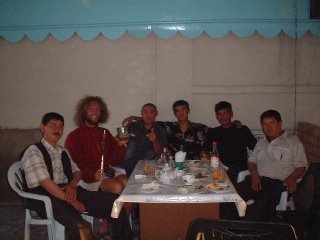
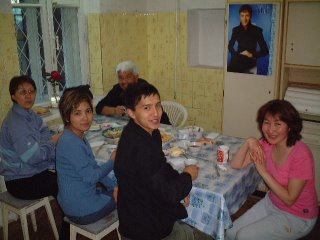


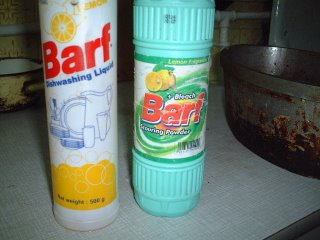

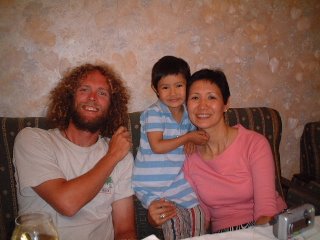

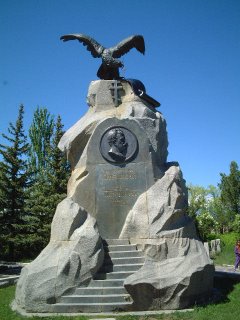
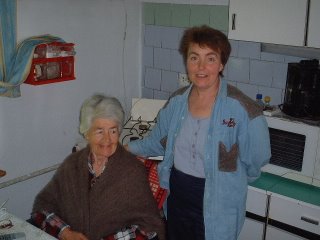
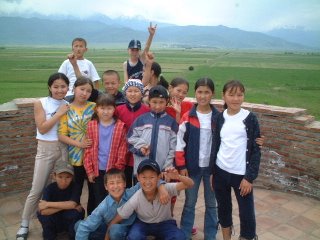
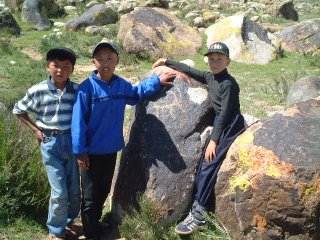
Saturday, May 29, Bishkek, Kyrgyzstan
I'm sitting here at the first really good Internet cafe I've seen since China, one where it doesn't take 20 minutes to log into Yahoo. Bishkek is a leafy, relaxed city that feels more like civilization than anywhere else I've been yet on this trip. I'm here tackling the fearsome bureaucratic hassles of visas and permits which bedevil Central Asian travel, and so far the struggle has been going my way, which makes me wonder what disasters may yet await.
I eventually bailed out of Karakol without going hiking in the highest part of the Tien Shan. The weather was terrible; every morning I would wake up in my comfortable yurt to the sound of rain hitting the roof. After three days of lassitude and extreme sloth, punctuated only by a visit to the Przhevalsky Museum (a monument to the greatest Russian explorer of Central Asia, Nikolai Przhevalsky, one of my heroes), I decided that my time would be put to better use riding towards Bishkek and tilting at consular windmills there.
On Monday, I awoke to more rain, but by the time I had dragged myself from bed and loaded up the bike, it had stopped, and I didn't get rained on at all as I rode. I wanted to get to Bishkek, 380 km away, in 3 days, since that would give me 2 days to devote to chasing visas before the weekend. The first day, riding around the northern shore of Lake Issyk Kul, I rode 140 km to the old resort town of Cholpon Ata. It was a flat, easy ride, through agricultural villages where everyone was out planting potatoes and past yet more ancient Scythian burial mounds. I lunched atop one of the mounds, gazing out towards the lake and the clouds which (of course) hid the mountain peaks behind. I listened to the BBC news on my shortwave radio and contemplated local history.
Issyk Kul was an important area in ancient times because it provides a rare expanse of flat land in a very rugged area, and because the lake moderates the extreme continental seasons of the rest of the region. The lake doesn't freeze in the winter, and it maintains a pleasant warmth in mid-summer while Bishkek bakes in the high 30s. The Scythians loved the area, burying many of their kings and chieftains, along with their gold, in large earth mounds along the north shore. The Western Turks, the great power of Central Asia in the 6th and 7th centuries AD, made it the site of their summer court, and Xuan Zang, the greatest Chinese traveller, visited them by the lake in 630 AD, just before the first Chinese Tang Emperor invaded and destroyed the Turkish state.
I spent the afternoon racing along the road through more villages and then past a series of Soviet-era sanatoria and beach hotels which line the shore near Cholpon Ata. It had the feel of any beach resort area out of season: closed restaurants and deserted hotels.
It was getting late by the time I pulled into town, and I was just wondering where I would find a hotel when a car pulled up beside me and the driver asked me where I was planning to sleep. When I said that I didn't know, he told me to follow him. I figured he probably rented out rooms in his apartment, and it would be cheaper than a hotel, so I pedalled after him, gamely trying to keep up. I became a bit concerned when he kept driving right through Cholpon Ata and out the other side, but we eventually reached a comfortable house in the next village. Aleksandr, my host, was a retired architect who in his youth loved bicycle touring and had ridden throughout Kyrgyzstan and neighbouring Kazakhstan. He was a wonderful host, feeding me vast quantities of great food, plying me with home-made wine and telling me stories of the history and culture of the Issyk Kul area and of his own adventures sailing the lake on a schooner he had built himself.
He convinced me to take the following morning off and come sightseeing with him, but sadly he received a phone call at 4 am announcing the death of an old friend and had to depart immediately. I got up, ready to inspect the local petroglyphs before beetling off towards Bishkek, and discovered that my prized shortwave radio was gone. Thinking back, I realized that I must have left it as an offering for the dead Scythians at lunchtime, and I decided that I would have to go back for it. I left my bike at Aleksandr's house and took a bus 90 km back down the road, remembering why I hate buses as my knees complained vociferously about being wedged into tiny spaces between the seats. After two hours I stopped the bus in the middle of nowhere, to the great surprise of the driver, and leapt out to run to the Scythian mound. My radio lay just where I had left it, hidden in the grass, but unfortunately I couldn't remember exactly where I had been sitting, and it was an anxious quarter of an hour before I saw it glint in the sun. The ride back to town was enlivened by a surprisingly good Hong Kong kung fu flick, and before I knew it I was back at Aleksandr's house.
His wife insisted on a lavish lunch before I set off, and I couldn't refuse more free food. Then I had to check out the local petroglyphs, 2000-year-old carvings (done by--who else?--the Scythians) of hunting scenes involving Marco Polo sheep, snow leopards, camels and horses which were pointed out to me by a posse of ten-year-old boys. I left town by an unusual route, racing downhill from the petroglyphs at insane speed along a disused airport runway, waiting for my bike to sprout wings so that I could make up all the hours I'd spent retrieving the radio. I rode hard during the few hours of sunlight left to me, through increasingly arid land, as the lake began to narrow and 4000-metre peaks, finally shedding their clouds, closed in around me. I rode into the desolate post-Soviet industrial hellhole of Balkychy around sunset, dodging begging children, belligerent drunks and malevolent dogs as I headed for the canyon leading downhill towards the capital. Gale-force winds reduced progress to a crawl and I found a sheltered ravine to pitch my tent for the night.
The next day I had hoped to reach Bishkek, aided by a 1000-metre drop in elevation, but instead I suffered through the most disappointing cycling of the trip so far. It was payback for the insane tailwinds which blew me down to the Kazakh border from Sairam Lake, as howling headwinds tried to blow me right back to Cholpon Ata. My progress was slowed to a sad 10 km/h even on the steepest downhill bits, and I slowly lost all enthusiasm for continuing the struggle. The scenery was pretty, with eroded red canyons beside the road and, as the river descended, luminescent green mountain pastures above it. It took 5 hours to get out of the canyon and into the plain of the Chuy River leading to Bishkek. Once I was in the lowlands, the wind abated a bit and the lines of roadside poplars provided some shelter, and I was able to resume more normal cycling speeds.
I made it to Tokmak, still some 60 kilometres from Bishkek, and settled into a roadside cafe to fill my empty stomach with kebabs, noodles and beer, the high-octane fuel of choice for cycle tourists. I was amazed at Aleksandr's story of having once cycled the entire 240 kilometres from Cholpon Ata to Bishkek in a single day, on dirt roads, on a 3-speed. He must not have had the headwinds I had, or else he was a real Lance Armstrong in his youth. While I was lamenting the sad state of my cycling prowess, the Kyrgyz men at the next table struck up a conversation with me, and before I knew it, I had joined their friend's birthday party, with numerous vodka toasts to his health. They delivered me to a local hotel and then took me on to a banquet hall for more toasts before I called it quits, pleading that I had to ride a bike to Bishkek the next day. They were an interesting crowd of dubious biznesmen wheelers and dealers, with nicknames like Michael Corleone and The Doctor. One of them looked very Italian, and I found out that he was a Chechen, one of the hundreds of thousands deported by Stalin to Central Asia during WWII, whose family had opted to stay in Tokmok rather than return to the Caucasus in the 1950s after Stalin's unlamented demise.
The next morning it was difficult to tear myself from bed and face the bike, and I was glad that I hadn't continued any later with the vodka toasts. I rode off slowly to Burana Tower, a local historical site, and spent a couple of hours pottering around inspecting the restored brick minaret, the collection of shamanistic carved human figures and the local museum, accompanied by a grade 7 class from Tokmok who adopted me, chattering away with excited questions and begging to have their pictures taken. I ordinarily dislike having self-appointed guides showing me around, but these kids were so excited and so much fun that I really enjoyed my time with them. Their teacher was pretty happy as well that they got a chance to practice their few words of English with me, and I had to promise to send them a postcard from Tajikistan when I got there.
The ride into Bishkek was uneventful: flat, busy, easy and somewhat hampered by an overwhelming desire to pull into a field and have a nap. As I pedalled, I noticed how many of the local villagers looked Chechen, their sharp features and Mediterranean faces contrasting with the local Russians and Kyrgyz. Before I knew it, I was in the capital, trying to make sense of a map that bore no resemblance to the reality of the streets. I eventually figured out that although the street names had been changed since Soviet times, no-one had bothered to change the actual street signs, so that my modern map bore names that didn't appear anywhere in the city. I rode past my guesthouse three times before a helpful policeman showed me the unmarked door.
In Sabyr's Place, a rambling house next to the Russian embassy, I have found a little oasis of culture and good humour. Sabyr is another architect, with brothers who are painters and sculptors, and he edits a prominent arts magazine. The cast of fellow travellers is entertaining, particularly the first bicycle tourist I have met this year. Antoine has just shaved off his beard to look respectable for consular officials, and the long sideburns he left make him look extraordinarily like the great Russian poet Pushkin, so much so that strangers call to him across the street "Hey Pushkin!", and are disconcerted to find that he doesn't speak a word of Russian.
Yesterday I spent at the Uzbek and Tajik embassies obtaining visas. I had heard horror stories from Antoine and others about the chaos at the Uzbek embassy, but as it turned out, everything went smoothly; I dropped off my passport at noon and was told to come back at 3:00 to retrieve it. In the meantime, I set off to search for the Tajik embassy, a non-trivial task as it wasn't in the Lonely Planet guidebook and nobody seemed to have heard of it. Finally the Dutch consul, whose office I stumbled across in my search, took pity on me and had his staff find the address for me. I rode my bike out into a distant suburb and knocked on the embassy door. To my surprise, I was ushered in and was able to start the process of applying for my visa even without having my passport in hand. I scampered back to the Uzbeks, got my passport back with an impressive full-page visa stamp and rode back to the Tajiks to drop off the passport. By 10 am Monday I should be ready to flee Bishkek and resume my Silk Road cycling peregrinations. Antoine may join me, at least as far as Osh, and it might be a nice change to have company along the road for a while. I have to be at the Tajik border south of Osh precisely on June 15th (I hate these restrictive Soviet-style visas which specify exactly what day I have to enter and exit the country!), and 2 weeks should leave me plenty of time for sightseeing along the way. I hope that if I have extra days at the end, I can spend them at Pik Lenin basecamp, dreaming of climbing this 7000-metre Pamir giant some summer soon.
I hope that everyone is well and is enjoying the approach of summer (at least those of you in the northern hemisphere). Stay well and have fun.
Carpe Diem
Graydon
